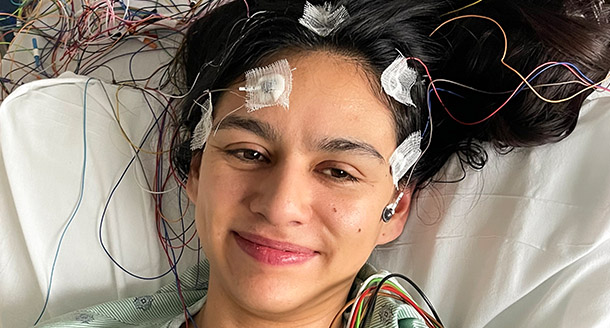Brain tumor patients, survivors, and caregivers from across the country met with congressional leaders to discuss the issues facing the community
National Brain Tumor Society, the largest nonprofit dedicated to the brain tumor community in the United States, today held its fourth annual “Head to the Hill” advocacy day in Washington, D.C. The event drew nearly 150 brain tumor advocates from 32 different states and the District of Columbia to Capitol Hill to educate their respective congressional delegations on the critical issues currently facing the brain tumor community.
“Head to the Hill has become an important yearly gathering for many patients, survivors, and caregivers to speak up about the issues effecting them,” said N. Paul TonThat, CEO, National Brain Tumor Society. “The voices of those who have been so deeply impacted by this disease are the most powerful advocacy tool, and we’ve seen Congress respond by introducing important pieces of legislation. However, there is still much work to be done, and we are committed to seeing it through.”
Brain tumors, both benign and malignant, are devastating and potentially life-threating illnesses that do not discriminate among who they affect and when. Unfortunately, very little progress has been made in the fight against the disease in the past four decades, and subsequently treatment options for patients remain limited in both number and effectiveness.
Therefore, as a leader in the fight against both adult and pediatric brain tumors, the National Brain Tumor Society and Head to the Hill participants focused their advocacy on three key issues during this year’s Congressional meetings:
- Increasing federal funding for government institutions that help facilitate brain tumor research, development, evaluation, and approval
- Improving pediatric cancer research and drug development
- Supporting oral chemotherapy parity
Federal Funding for Medical Research and Drug Review and Approval
As the largest funder of brain tumor research, the federal government’s investment in the National Institutes of Health, including the National Cancer Institute and National Institute of Neurological Disorders and Stroke, as well as its funding for the U.S. Food and Drug Administration, plays a vital role in the discovery, development, and approval of potential new treatments.
As such, brain tumor advocates asked Congress to prioritize funding for these agencies in the Fiscal Year 2015 budget to signal a commitment of support for brain tumor patients. Head to the Hill participants also urged lawmakers to continue support for the Peer Review Cancer Research Program, which makes grants for promising pediatric brain tumor research and is a part of the Department of Defense’s Congressionally Directed Medical Research Programs.
Pediatric Cancer Research and Drug Development
Brain tumors are the second most prevalent childhood cancer, and are the leading cause of cancer-related death in children under the age of 10. While many childhood cancers have seen significant progress in recent years, aggressive and hard-to-treat pediatric cancers – like many malignant brain tumors – have not benefited equally.
The currently pending Caroline Pryce Walker Conquer Childhood Cancer Reauthorization Act (HR 2607/S.1251) would help drive progress for pediatric cancer by creating more opportunities for research, authorizing grants for state registries to identify and track incidence rates and trends, and initiating the study of barriers to pediatric cancer research. The bill was originally passed unanimously in 2008, and brain tumor advocates at Head to the Hill asked their delegations to reauthorize the bill in 2014.
Oral Chemotherapy Parity
Temodar (temozolomide) is the standard of care drug for all brain tumor patients whose treatment includes chemotherapy. Temodar is almost exclusively administered orally, and for this reason health insurance companies often cover the treatment as a prescription drug benefit, rather than as a major medical benefit, such as traditional intravenous chemotherapy. The result is that patients are often subjected to onerous monthly prescription drug co-pays and co-insurance in order to access the only chemotherapy available to treat their brain tumor.
Thus, the National Brain Tumor Society supported the introduction of bipartisan, bicameral oral chemotherapy parity bills in The Cancer Drug Coverage Parity Act (HR 1801) and Cancer Treatment Parity Act (S.1879). The bills would prohibit health insurance plans from charging patients more to access oral chemotherapy drugs, including Temodar, than they would for traditional IV chemotherapy. National Brain Tumor Society played a crucial role in the crafting of the bills, as well as mobilizing efforts to gain co-sponsors and bipartisan support. At Head to the Hill, advocates pressed their representatives and senators to continue moving the legislation forward.
“After losing my father to brain cancer in 2011, I began participating in Head to the Hill and other brain tumor advocacy efforts as a way to fight back against this terrible disease,” said Adrienne Wilk, the National Brain Tumor Society’s State Lead Advocate for Tennessee. “I’ve found there is great value in speaking to, and educating my representatives in Congress on the needs of this community. They are willing to listen; we just need to be there to ask.”
Nearly 700,000 Americans are currently living with a primary brain tumor, and an estimated 14,000 people will die because of a primary malignant brain tumor this year. More so than any other cancer, a brain tumor can have life-altering psychological, cognitive, behavioral, and physical effects. There are no known prevention or early detection methods, and there is no cure.



